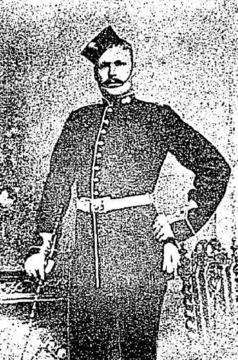
SCHULTZE, Henry Emil
| Service Number: | 5336 |
|---|---|
| Enlisted: | Not yet discovered |
| Last Rank: | Private |
| Last Unit: | Not yet discovered |
| Born: | St Arnaud, Victoria, Australia, 12 September 1875 |
| Home Town: | St Arnaud, North Grampians, Victoria |
| Schooling: | St Arnaud State School No. 1646, Victoria, Australia |
| Occupation: | Professional Soldier (British Army) |
| Died: | Died of wounds, Kimberley Area, Cape Colony, South Africa, 24 November 1899, aged 24 years |
| Cemetery: | Not yet discovered |
| Memorials: | Australian War Memorial Commemorative Roll, St. Arnaud Boer War Memorial, St. Arnaud High School Henry Emil Schultze Memorial Plaque |
Boer War Service
| 25 Oct 1899: | Embarked British Forces (All Conflicts), Private, 5336, 3rd Battalion, Grenadier Guards embarked at Gibraltar on board SS Ghoorkha. | |
|---|---|---|
| 23 Nov 1899: | Wounded British Forces (All Conflicts), Private, 5336, Wounded near Belmont Sth Africa during the action at Gun Kopje. Died of his wounds (no details) the next day 24 November 1899. | |
| Date unknown: | Involvement Private, 5336 |
Help us honour Henry Emil Schultze's service by contributing information, stories, and images so that they can be preserved for future generations.
Add my storyBiography contributed by Robert Wight
Guardsman (Pte) 5336 Henry Emil Schultze was born at St Arnaud, Victoria, and served in the Victorian Permanent Artillery. He migrated to the UK where he worked in the Hotel Cecil in London then joined the Grenadier Guards (3rd Battalion).
The 3rd Battalion Grenadier Guards sailed from Gibraltar in the SS Ghoorkha on 25 October 1899, and arrived at the Cape about 15 November.
The battalion was made part of Lord Methuen's force when he advanced to relieve Kimberley. On the 22 November 1899 Lord Methuen reconnoitred the extensive and very strong position held by a Boer force of from 2,000 to 2,500 men near Belmont, about 70 km South West of Kimberley on the rail line.
The general's orders for the 23rd were, briefly, that at 0300 the Guards Brigade including the 3rd Grenadiers were to advance on a hill called Gun Kopje. During this engagement, Private Schultze was wounded in action (no details) and died of his wounds the next day 24 November 1899.
He was buried near Leeu-Gamka, Western Cape Province, South Africa, and is also remembered on the Guards Memorial, Belmont, South Africa.
Source: bwm.org.au & Robert Wight
Biography contributed by Faithe Jones
We give a portrait of Private Schultze, of the Grenadier Guards, a Victorian native. A letter has been received by Mrs. Schultze, now of Windsor, from Colonel Ricardo, the officer commanding the Grenadier Guards,- announcing the death in South Africa, on 25th November, of her son, Henry Emil Schultze, from wounds - received in the battle of Belmont, two days before. Deceased was 24 years of age, unmarried and a native of St. Arnaud. He trained for the militia in the Victorian Permanent Artillery and some four years ago proceeded to London and served a term of three years with the Grenadier Guards in England and Gibraltar. On leaving the ranks he was placed on the reserve and was occupying an important position in the Hotel Cecil, London, when the call to arms was made. He was one of the three big gest men in the British army, his size and bearing securing for him a prominent position at the royal functions. General regret is felt for the deceased's widowed mother and family.
A VICTORIAN VOLUNTEER.
A correspondent writes from Thackaringa : -Re Private H. E. Schultze, a native of St. Arnaud (Victoria), whose death after the battle of Belmont is indeed lamented by his old comrades of the " B" Company Victorian Rangers. When the lad (as he then was) joined that company he had to buy even his own uniform. In his obituaries he is not credited with serving in the Rangers, though mentioned as serving in the Victorian Permanent Artillery. I served in " B" Company, and Schultze and I often met at Bendigo and other places. He was called " Captain Adey's Baby"; and the Rangers was Captain Adey's regiment. He took part for the Rangers in winning a shield against all regiments (volunteers), the winning of which was looked upon as a triumph in battle firing, drill, turnout, and general appearance. When men had to pay for their own clothes it was to their own interest to do good work, some may say ; but I go farther and say that when men volunteer and put their hand in their pocket as well, that is where the motto, " For Queen and home," is best understood. I see Schultze now as I saw him last-a boy of about 16, or scarcely that, beardless, and then as tall as the tallest of us. He was a real nice lad at parade, a good companion, full of life and " go," and fond of his duty, On a hot day at battle firing I have seen men fall down in a faint and carried off the field while we were being put through the form of attack; eight men fainted at the last manoeuvre of that kind we attended-a blazing hot day at Bendigo, eight years ago. I heard afterwards that Private Schultze joined the Artillery at Queenscliff, and then went home to join the Guards.









